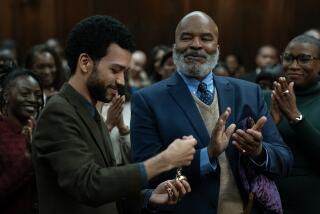Dangerous Movies : The cynical message for black and brown teen-agers: ‘Salvation is a slim, determined white woman.’
Before I saw the movie “Dangerous Minds,” I saw what the trailer for it was selling: the same old image of people of color, wrapped in the latest fashions. In the trailer, the protagonist, a former Marine, takes up teaching and is assigned to a special class in a tough school. The students are highly gifted but have low grades and--as a voice-over in the trailer informs us--”a lot of hate.” The ex-Marine’s assignment is to reach them. If the Marine cannot do it, it cannot be done. The ex-Marine is played by Michelle Pfeiffer. The various underachievers, whose names have no marquee value, are an assortment of brown and black teen-agers who have attitude, problems and hip-hop clothing to spare. Big braids, backward caps, shaved heads, the Scowl. You know it: the universal, angry African American/Latino kid scowl that announces that the world has not given them a break.
According to the trailer, the primary resistance to the ex-Marine’s efforts to save these kids from themselves and their environment, after the teen-agers themselves, comes from their families. A black mother tells the Marine (who has risked who knows what to go into the neighborhood to find out why the woman’s children aren’t in school), “Find yourself some other poor boys to save.” As my brow furrows, I am saying to myself, “It is only a movie.”
It is a movie saying to black and brown kids who have been warehoused by an education system that salvation is a slim, determined white woman. It is a movie selling the notion that the parents of needy kids would rather see them fail than let the white woman help them. And hordes of these teen-agers will see this movie. Local radio stations are giving away premiums of groups of six tickets to a private screening. The Magic Johnson Theaters in Baldwin Hills runs the trailer in its new multimedia lobby. Members of the target audience look up from their flirting and their video games as the driving beat of an old Stevie Wonder social protest song presages the preview. “That’s gonna be good,” they assure each other. They hear the music, they see the kids in the film that look like them. Do their subconsciouses actually hone in on the question the Marine asks her colleague: “Who are those kids? Rejects from Hell?”
If we lived in less interesting times politically, perhaps I would see merely a trailer for yet another hip-hop movie that does not count me in its audience. But the times cannot be ignored. The governor of California used the specter of undeserving brown children burdening the state’s social welfare system to encourage voter support for denying basic services to children whose parents could not prove legal residency. Congress recently approved a budget featuring sharp cuts in education, particularly the Head Start Program. In defense of shutting down affirmative action programs for racial minorities, it has been adamantly repeated that less-qualified brown and black candidates are being “given” educational and employment opportunities over deserving whites.
This is the backdrop against which “Dangerous Minds” is being sold.
My instincts tell me never to trust a trailer. I have been promised comedy by a trailer for a movie that had none. I have been given to expect original suspenseful drama and gotten the trite and formulaic. So I gave “Dangerous Minds” an opportunity to be the “uplifting, intelligent film that rises to the head of the class,” intimated in the print advertisements. But the beat and the look of the trailer, and ultimately the movie itself, insist on something else. It is swathed in the aura of the Great White Hope movie. People of color as sheep, led to redemption through the good offices of a courageous white shepherd. At one point during the film, one of the students pleads with the teacher not to abandon them, suggesting that, without her, they will not graduate: “You are our light.”
I could forgive this movie for being unoriginal and improbable if it weren’t for the way it was sold. All that scowling and underachieving, all that violence juxtaposed against the stalwart ex-Marine’s conviction that she could show them a better way. It seems so calculated and cynical.
More to Read
Only good movies
Get the Indie Focus newsletter, Mark Olsen's weekly guide to the world of cinema.
You may occasionally receive promotional content from the Los Angeles Times.










